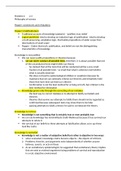Problem 6 2.3
Philosophy of science
Popper: conjectures and refutations
Popper’s falsificationism
Traditional account of knowledge (platonic) – justified, true, belief
Logical positivists tried to develop an inductive logic of justification- tried to develop
a truth preserving, ampliative logic, that builds propositions of wider scope from
observations of small scope
Popper - Claims that truth, justification, and belief are not the distinguishing
characteristics of knowledge
Knowledge is not justified
We can never justify propositions or theories because:
1. we can never conduct all possible tests, therefore, it is always possible that one
of the unconducted tests might falsify our theory
- he claimed that all the tests that will be conducted will be a very small
fraction of all possible tests - so small that what is unknown overwhelms
what is actually observed
- this does not lead to epistemological nihilism or scepticism because he
maintains that we can rationally criticise our theories and tentatively hold
those that have best survived our criticism
- Confirmation is not the best method for arriving at truth, but criticism is the
best method for elimination
Knowledge grows only through the correcting of our mistakes
- the best way to correct mistakes is to attempt to falsify our beliefs and
theories
- theories that survive our attempts to falsify them should not be regarded as
confirmed because subsequent tests may show them to be false
- passing attempts to falsify a theory he said to corroborate the theory
knowledge is not true
Knowledge is not something that is certainly true or even probably true
we can say knowledge has verisimilitude (truth-likeliness) because it has survived our
attempts to refute it
the survival of our beliefs to these attempts at falsification allows us to say these
look like truths
Knowledge is not belief
knowledge is not a matter of subjective belief but rather is objective in two ways:
1. when evaluated, knowledge claims become objects—the objects of criticism.
2. Problems, theories, and arguments exist independently of whether anyone
believes, asserts, or acts on these
3. As an evolutionary epistemologist, he suggested that evolutionary theory implies
that we exist as evolved organisms facing problems of survival and reproduction
in a real, objective environment
, We can never know things in themselves – things independent of our observations,
but we can know that the environment tolerates our perceptions, theories, and
movements through it, because we are surviving
- And false theories, perceptions, and movements can get us killed
Thus, error elimination is a critical epistemic process according to popper
How did he arrive at these conclusions?
Demarcation question- when should a theory be categorised as scientific, what
distinguishes it from non-science or pseudoscience
He rejected the accepted answer of the time, that is , Science relied upon an
inductive, empirical method while pseudoscience did not
- he thought that obvious pseudosciences such as astrology often made
appeals to observation an experiment, but were not properly scientific
His demarcation question became ‘what character rises are genuinely empirical
method from a pseudoempirical method
- the problem with pseudoscientific theories is that the world was full of
verifications of these theories. these theories were confirmed no matter what
happened
- He took these confirmations as confirming only that cases could be
interpreted in light of the theory. he took this to be rather trivial because he
thought that every conceivable case could be interpreted in light of these
theories
- He believed Freudian theory was pseudoscientific because it ruled out no
observable state of affairs. Any sort of reaction is possible and is ‘explainable’
by the theory. E.g. a neurotic individual may fear his father due to castration
anxiety or he may love his father due to reaction information
He believes that the impressive aspect of einsteins theory is that it is inconsistent
with certain possible results of observation. it makes risky predictions - it states that
certain states of affairs cannot happen
- a theory is scientific if and only if it rules out some observable states of affairs
- A test of a theory is a legitimate test only if it is an attempt to falsify that
theory by seeing if states of affairs it rules out occur or not
He recognised that a widespread and important problem with rational belief
formation in general is what we now call confirmation bias
Every good theory should divide the set of all statements derivable from it into two
subsets:
1. contains observation statements that are consistent with the theory -
uninteresting set from an epistemological and thus research point of view
2. contains potential falsifiers - efficiently and ardently attempting to see whether
one of these potential states of affairs actually obtains
In general, the more precise a statement is, the more falsifiable the statement is
The more universal the statement, the more falsifiable the statement is
- Initially we would think that a paradigmatic scientific statement would be
precise and would be very general or even universal, and this is just what
poppers falsifiability criterion also entails
severe testing - we attempt to deduce the most improbable consequences of our
theory and check on whether these obtain





